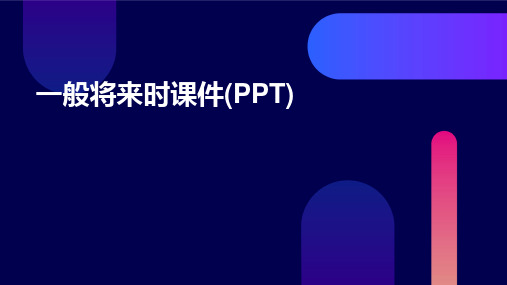一般将来时公开课课件PPT.剖析
(完整版)一般将来时课件(PPT)

2.与“next一家” 连用
next
time year week month term Monday at 7:00 next Sunday morning ……
2.He will find some meat in the fridge soon. (变一般疑问句) W __i_ll he _f_in_d _a_n_y_ meat in the fridge?
3.She will stay there in a week. (对划线部分提问) __H_o_w _s_o_on_ w_i_ll__ she _s_t_a_y_ there?
We will/shall go to Beingjing next week.
He will go to Beingjing next week
(2).变一般疑问句和否定句:
They will have an English party next week. Will they have an English party next week?
2. be going to+do可表示事先计划的意图,而 will 则表示说话人当时决定的意图;
We're going to drive you home after the meeting. Don't call a taxi. We'll drive you home.
I feel ill now, and I'll go to see the doctor. I'm going to see the doctor this evening.
一般将来时公开课PPT课件

表示计划和打算
01
常见的表示计划和打算的词语
plan, intend, expect等。
02
句子结构
主语 + plan/intend/expect + to do sth.
03
例子
They plan to travel to Europe next year. (他们计划明年去欧洲旅
行。)
表示预测和推断
一般将来时基本概念
定义及作用
定义
一般将来时表示将来某一时刻的动 作或状态,或将来某一段时间内经 常的动作或状态。
作用
用于表示将来的计划、打算、预测、 期望等。
构成形式
will + 动词原形
表示将来的动作或状态,如“I will go to the park tomorrow.”(我明天将去公园)。
现在进行时常用now、at the moment等时间状语, 而一般将来时常用 tomorrow、next week等 时间状语。
与过去将来时的对比
01
含义不同
02
动词形式不同
03
时间状语不同
过去将来时表示从过去某一时间看将要 发生的动作或状态,而一般将来时表示 从现在看将要发生的动作或状态。
过去将来时的动词形式为“would+动 词原形”或“was/were going to+动 词原形”,而一般将来时的动词形式为 “will+动词原形”或“be going to+ 动词原形”。
文学作品中例句欣赏
我预见到了未来,那将是一个充 满希望和美好的时代。—— 《1984》
明天又是新的一天。——《乱世 佳人》
01
“明天,我会想出一个办法把他 弄回来,”她心里想。——《飘》
初中一般将来时公开课课件ppt

单击此处添加大标题内容
doctor, actor, lawyer or a singer 医生,演员,律师,还是歌手?
why not president, be a dreamer 为什么不能是当总统呢,要成为一个梦想家
you can be just the one you wanna be 只要你想,你就能成为你想做的人
否定句:Bus will not run everywhere. 疑问句:Will bus run everywhere? People will have robot . 否定句:people won’t have robot. 疑问句: Will people have robot? People will have less teeth. 否定句: People won’t replace people 疑问句: Will robot replace people?
• will be; is
B. is; is
• C. will be ; will be D. is ; will be
3. Mother me a nice present on my next
birthday.
A. will gives B. will give C. gives D. give
Conclusion 总结
构成:1.肯定句:主语+will +动词原形+其他
时间标志词:
tomorrow
soon
from now on
In the future
next+
in +
2否定句:主语+won’t+动词原形+其他
一般将来时课件(PPT)

“be able to”表示将来有能力做某 事时,使用一般将来时形式,例如“I will be able to help you”。
情态动词如“can”、“may”、 “must”等,在一般将来时中通常直 接加动词原形,例如“I can swim”。
03
一般将来时在句子中的运用
陈述句中的使用
表示将要发生的动作或存在的状态
纠正方法
应使用正确的将来时形式,如 "He will go to the park tomorrow." 或 "He is going to the park tomorrow."
忽略动词变化规则
错误示例
They will play football in the future.(忽略了动词play在将来时中的变化)
纠正方法
在将来时中,应使用正确的助动词或情态动词形式,如 "I will be able to help you with your homework." 或 "I can help you with your homework."
错误示例
He will must finish his work before leaving.(错误地使 用了情态动词must)
作用
用于表示未来的计划、打算、预测、 假设等。
常见表达形式
will + 动词原形
表示将来的动作或状态,如“I will go to the park tomorrow.”(我明天将去公园。)
be going to + 动词原形
表示计划、打算或即将发生的动作,如“I am going to study hard this semester.”(我这 学期打算努力学习。)
一般将来时PPT课件

•一般将来时基本概念•一般将来时结构与用法•一般将来时时间状语及标志词•一般将来时与其他时态对比•一般将来时在各类从句中运用•一般将来时误区及注意事项•总结回顾与拓展延伸目录01一般将来时基本概念定义与特点定义特点表现形式will + 动词原形be going to + 动词原形现在进行时表示将来预测未来计划与安排条件与假设030201使用场景02一般将来时结构与用法主语+ be not going to + 动词原形+ 其他成分主语+ be to not (非标准用法,尽量避免使用) + 动词原形+ 其他成分主语+ will not (won't) + 动词原形+ 其他成分Will + 主语+ 动词原形+ 其他成分?Be + 主语+ going to + 动词原形+ 其他成分?Be + 主语+ to + 动词原形+其他成分?(较少使用,多用于书面语)特殊疑问词动词原形特殊疑问词going to +成分?特殊疑问词to +(较少使用,多用于书面语)注意:在一般将来时的使用中,要注意区分不同语境和表达方式的细微差别,选择合适的结构进行表达。
同时,也要注意与其他时态的区分和联系,避免混淆使用。
特殊疑问句结构03一般将来时时间状语及标志词常见时间状语表示将来的时间状语表示计划或安排的时间状语标志词识别与运用04一般将来时与其他时态对比与现在进行时对比时间指向不同01动词形式差异02使用情境不同03时间基准差异动词形式变化使用情境区别时间范围不同动词形式区别使用情境差异05一般将来时在各类从句中运用在宾语从句中运用01 02定语从句的时态取决于它所修饰的先行词,如果先行词是将来时态,定语从句也使用将来时态。
如果先行词是过去将来时,定语从句则使用过去将来时。
定语从句中表示将来的时间状语有:tomorrow, next year, in the future 等。
06一般将来时误区及注意事项误区二过度使用“will”和“going to”。
一般将来时课件ppt(共17张PPT)

Jim going to
afternoon?
in the playground tomorrow
4. .Jim is going to play football in the playground tomorrow afternoon.
Jim going to play football tomorrow afternoon?
2)在浊辅音和元音后读/d/.
一般过去时, 要用动词过去式. Jim is going to play football in the playground tomorrow afternoon.
Jim is going to play football in the playground tomorrow afternoon. ⑵are变为were。
there were many beautiful flowers there. 一般将来时表示将来某个时间要发生的动作或存在的状态常与表示将来的时间状语连用
⑴am ,is变为was。
So she They to read some books.
What did they do in the park? 1)在清辅音后读/t/ .
(3).动词过去式变化规则
a)一般情况下,直接加ed.如:wash--washed, look---looked; b)以不发音字母e结尾的,加d.如:like---
liked, dance---danced; c)以“辅音字母+y”结尾的,变y为i再加ed. 如:study---studied;
food and (play) lots of games. They
(come) home at 4:30.
初中英语 一般将来时课件(PPT18张)
Ⅳ.一般将来时的被动语态
一般将来时的被动语态表示“…将要被…”,其常用的表达形式有以下几种:
一般将来时被动语态:
will/shall + be /get done (表示意想不到的要发生的事情)
be going to be + done (表示按计划或安排发生的被动动作) be about to be + done (指将要发生的事情)
2.They ________ an English evening next Sunday. A. are having B. are going to have C. will having D. is going to have
3.—Tell him about the news when he _______, John.
考点2:考察一般将来时的不同表达方式
1.– Will his parents go to see the Terra Cotta Warriors tomorrow? – No, ________ (不去).
A. they willn’t. B. they won’t. C. they aren’t. D. they don’t.
基本结构:
1.主语+will/shall+do sth 2.主语+am/is/are+going to+do sth
3. 主表语示+位am移/is的/ar动e+词do可ing用s现th 在进行时表将来 4. 主特语定+时do间sth和条件状语从句可用一般将来时表将来
5.主语+am/is/are+(about)+to+do sth 注:之所以不用be是因为这是一般将来时,而be还包括过去式的 was、were
一般将来时PPT课件
05
解析
含有will的句子改为否定句时 ,在will后加not,缩写为 won't。
06
THANKS
感谢观看
06
一般将来时练习题精选与解析
选择题精选与解析
01
题目:I _______ to the cinema. Will you go with me?
02
A. go B. am going C. have gone D. went
选择题精选与解析
答案:B
解析:由后一句“Will you go with me?”可知是打算去做某事,是一般将来时,所以用现 在进行时表将来,选B。
题目:— What _______ you _______ to do tomorrow?
选择题精选与解析
— I _______ visit my uncle. A. are; going; am going B. are; going; am going to
C. are; going to; am going D. are; going to; am going to
区别
现在进行时强调当前正在进行的动作 或状态,而一般将来时则强调未来将 要发生的动作或状态。
联系
两者都可用于表示将来的情况,但侧 重点不同。现在进行时通过现在正在 进行的动作暗示将来,而一般将来时 则直接表达将来的动作或状态。
与过去将来时的区别与联系
区别
过去将来时表示从过去某一时间 看将要发生的动作或状态,而一 般将来时则是从现在看将来要发 生的动作或状态。
表示将来经常发生的动作或习惯
常用的时间状语
always, often, usually等 。
句子结构
《一般将来时》课件
be going to+动词原形
结构
主语+be going to+动词原形+其他 成分
例子
We are going to meet at the train station at 5:00.(我们计划在5点钟 在火车站见面。)
含义
表示计划或安排将来要发生的动作或 状态
用现在进行时表示
结构
主语+be+动词现在分词+ 其他成分
一般将来时可以用来表示对未来事件的预见或推测,通常与时间状语连用,如“in the future”、 “next year”等。例如,“It will rain tomorrow.”(明天会下雨。)
表示意图、打算或希望
总结词
表示个人的意图、打算或意图、打算或希望,通常与 表示意图的动词连用,如“plan”、“intend”、“hope” 等。例如,“I will visit my grandparents next week.”( 我打算下周去看望我的祖父母。)
含义
表示将来某个时间正在进 行的动作或状态
例子
He is coming here next week.(他下周将会来这 里。)
用一般现在时表示
结构
主语+动词原形+其他成分
含义
表示将来某个时间经常发生的动作或状态
例子
I do my homework every day.(我每天都会做作业。)
03
一般将来时的肯定句、否定句和 疑问句
感谢观看
基本构成
will + 动词原形
疑问句形式
Will + 主语 + 动词原形
否定句形式
一般将来时课件
表示预测和推测
总结词
表示预测和推测时,一般将来时用于描述对未来事件或情况 的预测或推测。
详细描述
在英语中,一般将来时也可以用于表示预测或推测,通常与 表示推测的副词连用,如"probably"、"possibly"、"likely" 等。例如,"It will probably rain tomorrow"表示明天可能 会下雨。
理解一般将来时在各 种语境中的应用。
学习方法
通过实例和练习,深入理解一 般将来时的语法规则和用法。
通过模仿和练习,提高口语和 书面表达能力。
结合实际语境,运用一般将来 时进行交流和表达。
01
一般将来时的定义 和结构
定义
定义
一般将来时是表示将来某个时间 将要发生的动作或存在的状态, 常常与表示将来的时间状语连用 ,如“明天”、“下周”等。
与条件状语从句连用
总结词
表示在满足一定条件下,未来将发生的 动作或状态。
VS
详细描述
在英语中,当句子与条件状语从句连用时 ,一般将来时可以用来表示在满足一定条 件下,未来将发生的动作或状态。常见的 条件状语从句包括"if"、"unless"、 "when"等。例如,"If it rains tomorrow, we will stay at home."表示 如果明天下雨,将会待在家里。
01
一般将来时的否定 形式
否定句型
ቤተ መጻሕፍቲ ባይዱ主语 + will not + 动词原形
表示主语将不会进行某个动作。例如,“He will not come tomorrow.”(他明天不会来。)
- 1、下载文档前请自行甄别文档内容的完整性,平台不提供额外的编辑、内容补充、找答案等附加服务。
- 2、"仅部分预览"的文档,不可在线预览部分如存在完整性等问题,可反馈申请退款(可完整预览的文档不适用该条件!)。
- 3、如文档侵犯您的权益,请联系客服反馈,我们会尽快为您处理(人工客服工作时间:9:00-18:30)。
What will the cat do ?
is going to
It will drink/eat.
is going to
What will they do this evening? They will watch TV. are going to
造句:(任何主语都用will+动词原形) 1.我下星期一将去学校。 I will go to school next Monday 2.她下周将帮我妹妹做家务。 she will help my sister do housework next week。 3.他们明天将去游泳。 They will swim with my sister tomorrow. 4.星期天我们将在星期一做作业。 We will do my homework on Sunday. 5.他明年将买一台电视机。 He will buy a TV next year.
will he(they/she) do?) next month, tomorrow , next week , in three
days (三天后),
“There be”句型的一般将来时:表示将来某地会有某人 或某物
肯定句: There will be +名词+其他成份
There is/are going to be +名词+其他成份
一般疑问句:把will 提到句子主语之前,结尾变问号。Will studen go to school in the future ?
特殊疑问句:特殊疑问词+will +主语+动词原形+其他? What will your dreaWhat is/are he(they) going to do?/What
What is she going to do? She’s going to shop/ go shopping.
will
What are they going to do ?
They are going to dance.
will
英汉互译。 1.我打算下个月将去长城玩参观。 I am going to visit the Great Wall next month. 2.他计划下周去钓鱼。 He is going to go fishing next week. 3.她决定明天去购物。 She’s going to go shopping tomorrow. 4.She is going to visit Beijing with her mother next year. 她计划明年和她的妈妈去北京参观。 5.They are going to dance in two days. 两天后他们将去跳舞。 6.我们下星期一将去买些水果。 We are going to buy some fruit next Monday. 7.路西和汤姆今天下午打算去游泳。 Lucy and Tom are going to swim this afternoon. 注意:be随主语的人称和数的变化而变化。
The Simple Future Tense
一般将来时
Unit 6 and Unit7
一般将来时的基本构成:be
going to+动词原形, will+动词原 形
next week
What is he going to do next week? He is going to go fishing. will
“主谓(宾)句型”的一般将来时:(任何主语都用will+动词原形)
肯定句:主语+ will +动词原形+(宾语)+其他。 Some day people will go to the moon .
否定句:在will 的后面加not即可。will not 可缩写为 won’t。 They won’t use books .
二:will (将要,将会)引导的一般将来时:表示将来某个时间要发 生的动作或存在的状态。也表示将来经常或反复发生的动作。最基 本的结构:will + 动词原形 ,与表示将来的时间状语连用, tomorrow (明天)the day after tomorrow (后天)before long (不久)next week (下周)next Sunday(下个星期天)in three days (三天后),in 100 years(在100年后) in the future (将来), someday (将来的某一天)soon (很快)等
一般将来时两种基本结构, 一:be going to引导 的一般将来时:表示将要发生的动作或安排,或打算、 计划、决定要做某事。结构为, be going to + 动词原 形 ,与表示将来的时间状语连用,tomorrow (明 天)the day after tomorrow (后天)before long (不 久)next week (下周)next Sunday(下个星期天)in three days (三天后),in 100 years(在100年后) in the future (将来), someday (将来的某一天)soon (很快)等。主谓(宾)句型”的一般将来时: 肯定句:主语+ is(am/are) +动词原形+(宾语)+其他 She is going to play basketball next Sunday. 否定句:在be 的后面加not即可。 She is not going to play basketball next Sunday. 一般疑问句:把be提到句子主语之前,结尾变问号。 Is she going to play basketball next Sunday? 特殊疑问句:特殊疑问词+be +主语+动词原形+其他? What is She going to play basketball next Sunday.
